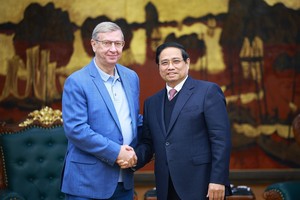Mongolia has abandoned a bid to renegotiate a huge deal to develop a vast copper and gold deposit and agreed to stand by its 2009 agreement with Ivanhoe Mines and Rio Tinto, a joint statement said.
The government of the resource-rich country last week invited Canada's Ivanhoe and Anglo-Australian miner Rio to discussions on changing the agreement on Oyu Tolgoi, including boosting its share in the project.
It wanted to increase its stake to 50 percent from 34 percent, but the companies said they were not prepared to renegotiate the deal.
"Ivanhoe Mines, Rio Tinto and the government of Mongolia... are pleased to confirm that all parties have reaffirmed their continued support for the (2009) investment agreement," said the statement, released late Thursday.
Ulan Bator faces mounting public pressure to secure a larger stake of the nation's plentiful resources in the run-up to parliamentary polls next year, and observers say it is looking to gain political mileage from the deal.
The government hopes the money it will make from Oyu Tolgoi and other deposits will enable it to pull thousands out of poverty, and is reluctant to appear to be giving away major chunks of its assets to foreign companies.
But analysts said renegotiating the agreement could undermine investor confidence in Mongolia.
"I was expecting a minor deal. But a minor deal would have set a precedent for further minor deals, causing never-ending anxiety. So they chose to leave it alone," said Dale Choi of the Ulan Bator-based Frontier Securities.
The multi-billion-dollar Oyu Tolgoi project -- still under development -- has been billed as one of the biggest investments in Mongolia since the former Soviet satellite went capitalist more than two decades ago.
Construction of the mine -- which currently employs 9,000 Mongolian workers -- is half complete and production is expected to begin late next year.
According to the deal signed with the two firms in 2009, Mongolia is allowed to increase its share to 50 percent only after the expiration of an initial 30-year investment agreement.
























